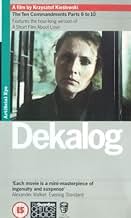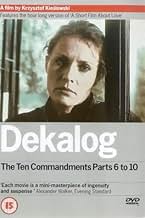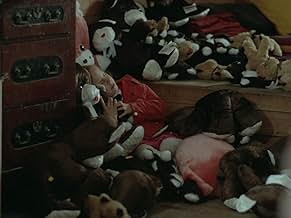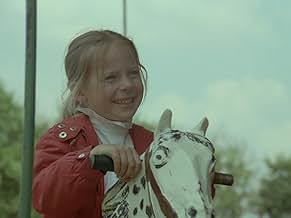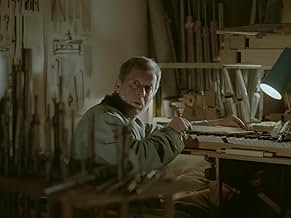Dekalog, siedem
- Episode aired Jun 15, 1990
- TV-MA
- 57m
IMDb RATING
7.8/10
4.1K
YOUR RATING
Raised as sisters, one is in fact the other's mother. Unwilling to continue living a lie, the mother tries to get her daughter back from her parents.Raised as sisters, one is in fact the other's mother. Unwilling to continue living a lie, the mother tries to get her daughter back from her parents.Raised as sisters, one is in fact the other's mother. Unwilling to continue living a lie, the mother tries to get her daughter back from her parents.
- Director
- Writers
- Stars
- Director
- Writers
- All cast & crew
- Production, box office & more at IMDbPro
Featured reviews
The template for Dekalog is that we enter a life with its anxieties (a dying husband on a hospital bed, a husband who disappeared on Christmas Eve) and at some point the narrative surface gives way and reveals a more fluid, more interdepentent life of suffering beneath.
This is evident here in a child sister abducted (after a theatric performance no less, after the swirl of fiction) and by next morning she has become a daughter. We explore a bit more but it never amounts to more than drama about the choices we have to make.
The Kieslowski I like, as I am discovering with these Dekalog viewings, is that way he has of visually slipping ahead and back. This is on the more typical end of the spectrum, all about moral anxiety and doublebinds. The ending is both emotional and convenient, poured on as syrup instead of laid out as vision.
This is evident here in a child sister abducted (after a theatric performance no less, after the swirl of fiction) and by next morning she has become a daughter. We explore a bit more but it never amounts to more than drama about the choices we have to make.
The Kieslowski I like, as I am discovering with these Dekalog viewings, is that way he has of visually slipping ahead and back. This is on the more typical end of the spectrum, all about moral anxiety and doublebinds. The ending is both emotional and convenient, poured on as syrup instead of laid out as vision.
In Decalogue 7, some tough questions are asked by Kieslowski about parenting especially the roles played by both a father as well as a mother. This film is told through the tough life of Ania-a young girl raised by her real grand mother Ewa, who does not know that in reality Majka is her real mother. As the film develops, audiences are bombarded with tough ethical as well as moral questions. Who is the real mother to a child ? The woman who gives "biological birth" to a child or a woman who is merely better at looking after a child. These questions make a lot of sense for Ania as it is not her mother Majka but grand mother Ewa who is able to allay her fears whenever she wakes up in night due to bad dreams about wolves. Regardless of what one might say, a true woman who has borne a child would always want herself to be addressed as "Maman/Mummy/Mother". She would never appreciate her child calling her by the first name. It is due to this dilemma that Majka is compelled to take Ania with her. This twist in the story raises a simple yet highly complex question : Can one steal what belongs to one self ? The answer is simple. No, one cannot steal what belongs to oneself. One merely needs to ask about one's own belongings if they have gone into other hands. This is the ethical element which Kieslowski must have wanted to present in his film. Like in some other films made by him, Kieslowski is honest as far the portrayal of characters is concerned. In Decalogue 7, the portrayal of men is brutal, frank and honest without any embellishments as men in this short film were mere mute spectators. They are not being able to make much difference in the lives of their daughters. Lastly, what makes this short film a good moving experience is that the maturity level of Ania is very high compared to other girls of her age group.
Episode 7 of 'Dekalog' is substantially less intense than most of those that preceded it, and seems rather less complex, as well. Young Majka (Maja Barelkowska) has surrendered her daughter Ania, the product of a teenager pregnancy, to the care of her mother, Ewa (Anna Polony). Here, Kieslowski condemns the sins of both parties: Ewa for taking possession of Ania as a substitute daughter (following her own inability to conceive a second child), and Majka for "stealing" back the child, despite being an inexperienced and arguably unfit mother. There's a bit of Tarkovskian flair in the cinematography by Dariusz Kuc. In one scene, Majka and Ania pause at the riverside beneath a bridge, and watch the current swirl debris downstream. It's such a lonely moment, incredibly peaceful and yet hauntingly so.
The young woman in the film has had a child that has been raised by her mother and father. They are judgmental because she was immature and, in their eyes, irresponsible. It is obvious that her stock is greatly diminished at home. So one day, she waits till a children's' play is over and kidnaps her daughter. This is a no win situation. The fact is she is not capable of keeping the child healthy and happy. They are on the run but have no real place to go. This is a sad tale of looking for some kind of independence when that boat has left the dock.
Custody battle between 22 year-old mother and her own mother over daughter born to the former when she was just 16. Thus, touches on overweening parental possessiveness alluded to in IV, VI and VIII. Very modest in scope, using few actors, a minimum of sets. Like VI, it suffers from lack of credibility: the young mother, a reasonably intelligent woman, undertakes a rather scatterbrained kidnap. Too much of the conflict takes place in the past, not in the movie itself. And, yes, there's color coding. Despite its shortcomings, the anguish is real, and deep enough to force one to recall one's own relationship with one's parents: Another Freudian foray.
Did you know
- TriviaArtur Barcis, who plays a recurring role in most episodes of Dekalog, was meant to play a man at the railway station, but did not appear in this episode due to technical difficulties.
- ConnectionsReferenced in The Simpsons: Lisa's First Word (1992)
Details
Contribute to this page
Suggest an edit or add missing content


